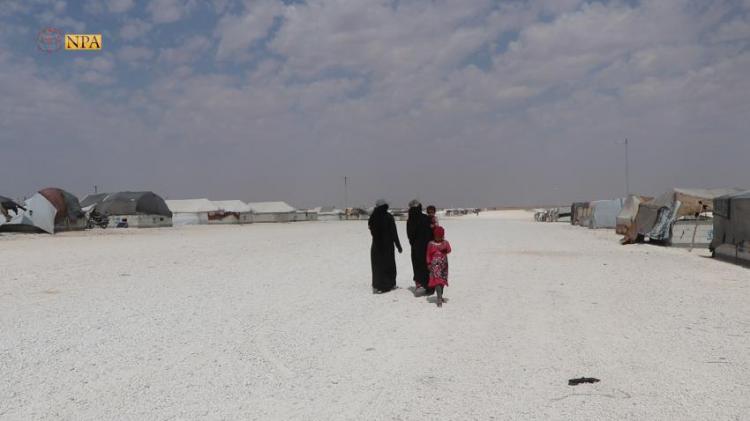Al-Tabqa – North-Press Agency
Jindar Abdulqader
The displaced people who have taken refuge in al-Mahmoudli camp in the outskirts of the city of al-Tabqa, west of Raqqa, suffer the deficiency of essential services in the camp, such as the unavailability of a school and a commercial market, in addition to the absence of tents’ covers to protect them from the heat of summer and cold of winter.
Al-Mahmoudli camp was equipped some months ago to receive al-Twehina camp IDPs.
The camp has a number of medical centers of international organizations and local associations, while it still lacks many basic services.
IDPs demands
Although the IDPs find al-Mahmoudli camp a safer place that provides more services, compared to al-Twehina and al-Rukban camps, where they endured hardship. Yet, the services in al-Mahmoudli camp are still low in comparison to the other camps in northeastern Syria, according to the residents.
Muhammad al-Farhan is an IDP from Hama countryside, told North-Press that they were living in al-Twehina camp, where “the services were very low and we were only getting food baskets”.
Al-Farhan pointed out that al-Mahmoudli camp is much better than al-Twehina camp, but it still lacks some basic services, such as the non-serviceability of tents for the winter, explaining that “heavy rains during the winter will increase the suffering of the IDPs and lead to the flooding of the tents with rainwater”.
As for the tents which are paved with stones, al-Farhan complained that the tents’ floor wasn’t cast, in contrary to the promises made by the camp’s administration, adding that some of the families “have cast the tent’s floor with concrete at their own expense,” noting that most of the families in the camp cannot afford to cast their tent’s floor.
Moreover, al-Farhan called on the organizations and the concerned authorities to deliver new tents and covers in place of the current bad tents, pointing out that “some sectors have installed pipes to drain away rainwater, while most of the other sectors are still without drains”.
“It is our home, because we don’t know when the crisis will end, so we would be able to go back home, so we only demand the provision of basic services,” said Farhan, who has spent three years of living in IDP camps.
For his part, Muhammad al-Hamdo an IDP from al-Salamiyeh, in the eastern countryside of Hama, demanded a “medical point on a 24-hour basis”, complaining about the presence of only one medical point which closes at 2 pm, wondering “what would we do in emergency cases or at late night birth cases? We are forced to move them to al-Tabqa or Raqqa”.
Al-Hamdo stressed that the situation in the camp is incomparable to al-Twehina’s, which he described as “tragic”.
Furthermore, al-Hamdo complained about the lack of the distributed bread to the IDPs. Each one “only receives two loaves a day, we often sleep without dinner, or we have to buy bread for a heavy price and a few loaves”.
Lack of education
There is no school for children in the camp, as there are 13-year-old children who are unable to read and write, according to al-Hamdo, stressing on the need for a school for educating the children.
“I am 12 years old and I cannot read nor write. We want educational centers,” said Ammar al-Hamdo, concluding that he wants to return to his village in Hama eastern countryside.
Al-Mahmoudli camp was established on June 24 of this year to receive the IDPs of al-Twehina camp, which lacked basic services, in addition to its inappropriate geographical location, being nearby the Euphrates River. Al-Mahmoudli camp shelters 5410 IDPs, distributed among 1277 families, 80 family came from al-Rukban camp which is located on the Syrian-Jordanian borders.

